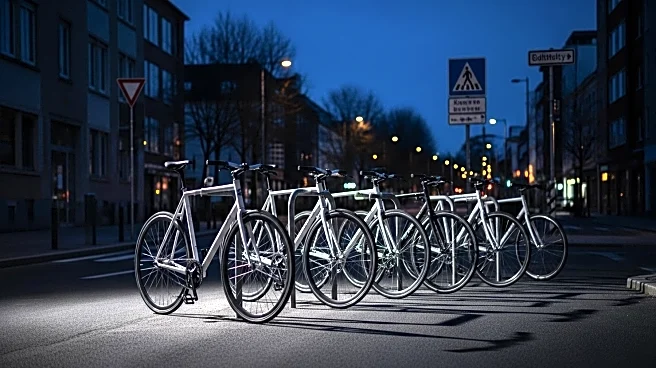What's Happening?
In Portland, Oregon, protesters organized an 'emergency' edition of the annual World Naked Bike Ride to demonstrate against the Trump administration's deployment of federal troops. The event, typically held in the summer, was hastily arranged to oppose President Trump's attempts to mobilize the National Guard in response to ongoing protests. Participants, embracing Portland's quirky reputation, pedaled through the streets wearing minimal clothing, despite the rainy and cool weather. The ride culminated at the U.S. Immigration and Customs Enforcement building, where authorities instructed protesters to remain on sidewalks to avoid arrest. The city is currently awaiting a court ruling on the legality of deploying federalized troops, following a temporary hold ordered by a federal judge.
Why It's Important?
The protest highlights the tension between local communities and federal authorities regarding the handling of civil unrest. Portland has been a focal point for demonstrations, and the use of federal troops has sparked significant controversy. The naked bike ride serves as a symbolic act of resistance, emphasizing the city's commitment to maintaining its autonomy and opposing federal intervention. This event underscores broader national debates about the balance of power between federal and local governments, particularly in the context of civil rights and public safety. The outcome of the court ruling could set a precedent for future federal involvement in local protests across the United States.
What's Next?
The appeals court panel's decision on the deployment of federal troops is pending, which could influence the dynamics of protest management in Portland and potentially other cities. If the court rules against the deployment, it may embolden local governments to resist federal intervention more assertively. Conversely, a ruling in favor of the deployment could lead to increased federal presence in cities experiencing unrest. Stakeholders, including local government officials, civil rights groups, and federal authorities, are likely to respond based on the court's decision, shaping the future of protest management and federal-local relations.
Beyond the Headlines
The naked bike ride reflects Portland's unique cultural identity and its approach to activism, blending humor and irreverence with serious political messages. This form of protest challenges traditional notions of dissent, using creativity to draw attention to critical issues. It also raises questions about the effectiveness of unconventional protest methods in influencing public opinion and policy. The event may inspire similar creative protests in other cities, contributing to a broader movement that prioritizes community engagement and nonviolent resistance.









